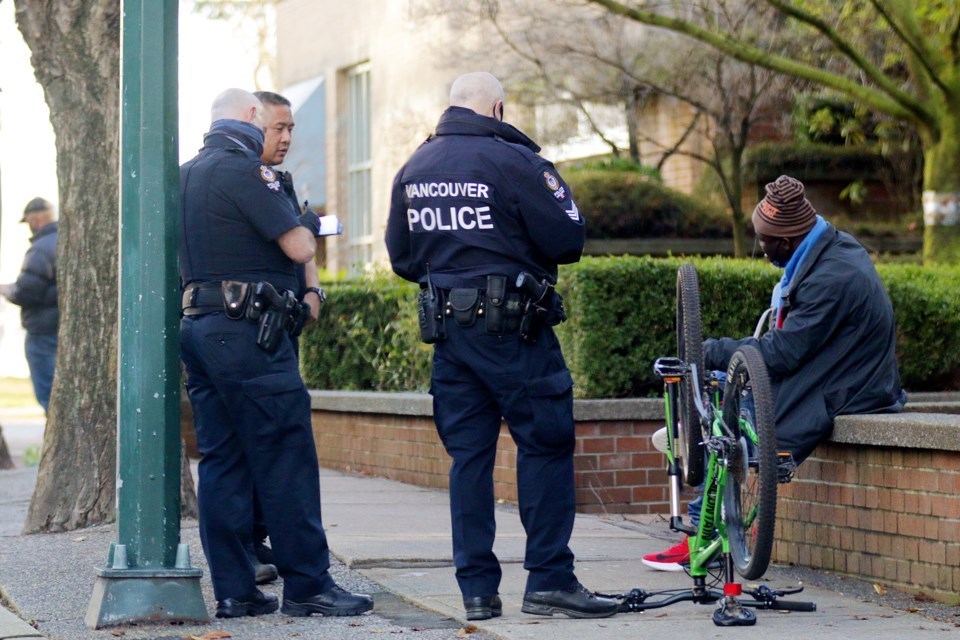Vancouver police say they conducted a total of 11 “street checks” on 14 people last year, a drop from 75 in 2020 and a substantial decrease from the thousands made in previous years.
That bit of remarkable news can be found in an audit report that goes before the Vancouver Police Board Thursday.
Why the decrease?
An explanation was not provided in the report.
But a previous VPD report presented to the board at this time last year said reasons for the drop are likely related to province-wide policing standards implemented in January 2020 in combination with the simultaneous adoption of a VPD policy on street checks.
“It is a fair argument to make that to whatever extent discrimination played a part in previous street check practices, the arrival of the [provincial] standard and VPD policy has had the practical effect of virtually eliminating street checks in Vancouver,” said the report from February 2021.
At the time, the report’s author acknowledged “public dialogue” also played a part in the decrease in street checks, which police say they use to make enquiries into “reasonable and legitimate” public safety concerns such as suspicious activity, crime prevention or intelligence gathering.
Regular readers will know the topic of street checks has been one featured in this space since VPD posted data to its website in 2018 that showed Indigenous and Black people were overrepresented in street checks between 2008 and 2017, when police conducted 97,281 checks.
That’s an average of 9,700 people per year.
Of those checks, 15 per cent (14,536) were of Indigenous people and more than four per cent (4,365) of Black people; Indigenous people make up just over two per cent of the population in Vancouver, and Black people less than one per cent.
That data prompted the BC Civil Liberties Association and the Union of BC Indian Chiefs to lodge complaints with the Office of the Police Complaint Commissioner and demand the practice be abolished.
Since that data was posted, police said they recorded 4,544 checks in 2019.
The policy shift in 2020 put the practice almost to a halt — when 75 were recorded — although there is still debate in the community as to what constitutes a street check, with police using the term “on-view crime” to describe 3,999 incidents in 2020.
The police’s definition of an “on-view” arrest: “Incidents that begin as a street check, but upon further information, turn into arrests (e.g., police learn, upon voluntarily obtaining ID, that the individual has a warrant out for his/her arrest).”
The VPD’s policy prohibits any street check, or any other type of police stop, if they are conducted randomly or arbitrarily, or for biased or discriminatory reasons.
Lawfully conducted street checks are permitted, provided they comply with policy and are used as part of an officer’s legal duties to preserve the peace and prevent crime.
So who were these people the police checked in 2021?
First, it should be noted that 41 street check records were submitted by officers last year, but only 11 were considered “actual proactive street checks,” the report said.
The 30 records misclassified as a street check were connected to a traffic stop, a call for service, a criminal investigation, a violation ticket investigation and an investigation that required a police report be submitted.
Of the 11 checks, five were for the well-being of the person. Four other checks were related to “victim protection, property crime, known offenders and event safety.” In two other checks, which involved three people, no public safety purpose was provided by officers.
“The [VPD’s] operations division is in the process of contacting the officers to determine if there was a public safety purpose for the two street checks that did not have a purpose articulated in the record,” the report said.
Of the 14 people checked, seven were Indigenous, six were Caucasian and one was Asian. Eight were male and six were female; the report didn’t provide ages or area of town where the people were checked.
However, the report said the “subject history” of the 14 people connected them as a suspect in an average of 15.6 different criminal investigations prior to the check; the report didn’t identify the nature of the crime in the investigations.
I reached out to the BC Civil Liberties Association and Union of BC Indian Chiefs prior to starting this column but hadn’t heard back prior to finishing this sentence.
I suspect their concerns are the same as they were last year when they joined Hogan’s Alley Society and the WISH Drop-in Centre Society to renew their call for street checks to be abolished,
“The issue is not whether there are 10 street checks or 10,000 street checks — the issue remains that there is no legal basis for street checks,” the coalition said at the time. “Even according to the [VPD] audit [from 2020], street checks continue to disproportionately harm Indigenous and Black communities.”
The board meets at 1 p.m. Thursday (Feb. 24) to discuss the report.
@Howellings



